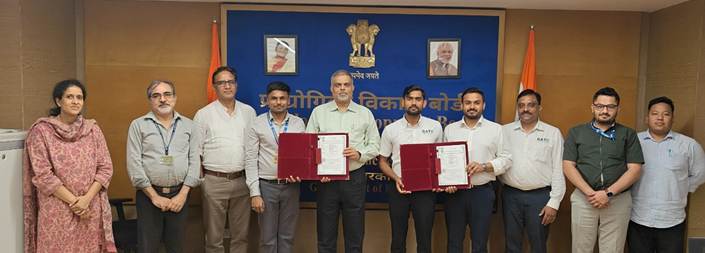



India's Technology Development Board is funding BatX Energies to commercialize its indigenous battery recycling technology. The project aims to extract high-purity lithium, cobalt, and other critical minerals from used batteries, promoting a circular economy, reducing imports, and strengthening India’s clean energy supply chain under the Aatmanirbhar Bharat initiative.

Copyright infringement not intended
Picture Courtesy: PIB
The Technology Development Board (TDB), a statutory body under the Department of Science and Technology, provided financial support to Gurugram-based startup (BatX Energies) to commercialize a indigenous technology for recycling lithium-ion batteries.
India's push towards electric mobility and renewable energy storage has reduces dependence on fossil fuel imports, however, it also increased dependence on imported critical minerals like lithium, cobalt, nickel, and manganese, which are the essential raw materials for lithium-ion batteries.
Import Dependence => India currently imports nearly all its lithium-ion cells and a vast majority of the raw materials needed for battery manufacturing. This creates significant supply chain vulnerabilities, as the global supply is dominated by a few countries.
E-Waste Challenge => The proliferation of electric vehicles (EVs) and electronic devices is leading to a massive, impending wave of used lithium-ion batteries. Improper disposal of this "e-waste" poses severe environmental hazards due to the toxic materials they contain.
BatX Energies has developed an innovative and sustainable technology to tackle this challenge head-on by creating a closed-loop ecosystem for battery materials.
Advanced Hydrometallurgical Process => The company employs a proprietary chemical process (hydrometallurgy) that works at low temperatures and pressures. This makes the process safer, less energy-intensive, and more environmentally friendly compared to traditional high-temperature (pyrometallurgical) methods.
High Efficiency and Purity => The technology has an impressive recovery rate of up to 97-99% for critical minerals. It extracts battery-grade materials like lithium carbonate and cobalt sulphate that are pure enough to be reused in new battery production.
A key advantage of the technology is that it can handle various types of lithium-ion batteries, regardless of their specific chemical makeup, making it highly versatile.
The entire process, from battery collection and shredding to the final purification of metals, is indigenously developed and patented. This reduces India's reliance on imported recycling machinery and know-how.
Strengthening Aatmanirbhar Bharat => By creating a domestic source of critical minerals from recycled batteries, the project directly reduces India's import bill and enhances its mineral security.
Promoting a Circular Economy => It transforms hazardous e-waste into high-value, battery-grade materials, effectively turning waste into wealth. This minimizes environmental pollution and conserves natural resources.
Supporting the Clean Energy Transition => Domestic recycling infrastructure is essential for the long-term sustainability of India’s EV and renewable energy goals. It ensures that the transition to clean energy does not create a new environmental crisis in the form of battery waste.
Positioning India as a Clean-Tech Leader => The successful commercialization of this indigenous technology can set new global benchmarks and position India as a leader in the sustainable battery recycling and critical mineral recovery sector.
Must Read Articles:
India Backs Sodium-Ion Batteries
Source:
|
PRACTICE QUESTION Q. "For India to truly benefit from the Electric Vehicle (EV) transition, a robust domestic manufacturing ecosystem for batteries is non-negotiable." Critically analyze. 150 words |






© 2026 iasgyan. All right reserved